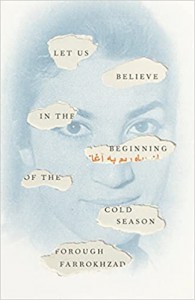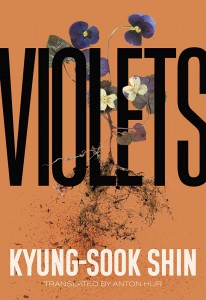In this month’s roundup of translations, we review the works of two iconic feminist writers, Forough Farrokhzad and Kyung-sook Shin, who trace, narrativize, and engage with gender and politics in its most vivid and various forms. In dialogue with the greater schemes of sexuality, passions, and poetics, these women writers work within and trespass the boundaries of their language to paint bold new portraits of the world, as a place lived in the mind.

Let Us Believe in the Beginning of the Cold Season by Forough Farrokhzad, translated from the Persian by Elizabeth T. Gray, Jr., New Directions, 2022
Review by Georgina Fooks, Director of Outreach
A poet of (com)passion: such is just one of the myriad ways to encapsulate the unique encounter with Forough Farrokhzad and her poetry. One of 20th-century Iran’s most celebrated and outspoken poets, she was controversial for the ways in which she lived and loved—openly, in transgression of patriarchal societal norms—and as a result, her work was banned for more than a decade after the Islamic Revolution. Yet, her legacy has lived on in illicit fragments and poems shared between readers, and now she is one of Iran’s best-loved women poets, widely read and translated. Through the work of Elizabeth T. Gray, Jr., this latest translation seeks to offer lovers of poetry a comprehensive critical edition of Farrokhzad’s work.
Born in 1934, the poet’s turbulent life was tragically cut short by a car accident in February 1967, leaving us with a nonetheless prolific oeuvre spanning a wide range of creative endeavours. A poet, filmmaker, actress, painter, and more, her work across various formats bears witness to the vibrancy of human life in the face of suffering, and to the wonders and pleasures of living despite overwhelming pressures and pushbacks.
Farrokhzad is undoubtedly a poet of romance. Drawing on a long tradition of Persian love poetry (Rumi was one of her great inspirations, according to Sholeh Wolpé), Farrokhzad’s work remains unique in its fervent declarations of physical and emotional intimacy, opening up possibilities for women poets in the Persian language. The opening poem of the collection, ‘Captive’, points to the vastness of desire:
I want you, and I know that never
will I hold you as my heart desires
You are that clear bright sky
I am a captive bird in the corner of this cage
How to write something as simultaneously intangible and embodied as desire? Farrokhzad paints love as the sky, vast and endless, in an attempt to write that feeling of enormity, more wide-ranging than the page can contain. This open ardour is itself revolutionary; the captivity of the poetic subject alludes not just to her powerlessness in the face of desire, but to the social mores that would have a young woman’s desires remain concealed. Not only does Farrokhzad express the affecting power of desire, she also translates how it transforms the body. ‘Sin’ is a particularly lustful and evocative poem:
I sinned a sin full of pleasure
in an embrace that was warm and fiery
I sinned in arms that were hot
and vindictive and made of iron
The subject of the poem is transparent, but there is no shame in this trespass; it is almost as if the definition of the word ‘sin’ is reappropriated in Farrokhzad’s work, to reclaim a poetics and politics of pleasure. The viscerality of the poem’s desire is so believable that it caused a scandal in Tehran’s literary scene; it prompted revelations of her affair with Nāsser Khodāyār, editor of the literary journal Rowshanfekr, and the subsequent fallout led to the dissolution of her marriage and losing custody of her son. As Elizabeth T. Gray, Jr observes in her translator’s note, Farrokhzad went on to revolutionise Persian poetry in the wake of this scandal. She set an unforeseen precedent in her scorchingly intimate poetics, blazing new trails for her fellow women poets to follow.
It is easy to be ensnared by literary gossip and drama, but Farrokhzad’s poetry also bears witness to the consequences of heartbreak and tragedy. She is alive to the dual sense of things, particularly of love:
Alas, we are happy and calm
Alas, we are sad and quiet
Happy, because we love
Sad, because love is a curse
Even if she would choose ‘instead of the golden crown of divinity / the dark and painful pleasure of sin’s embrace’, her poetry points to the dangers of such choices. In ‘Return’, a poem written for her son, she sees death; ‘my town was the grave of my desires’. In the terrible beauty of her verse, poetry is dangerous—but poetic language offers Farrokhzad the space for both passion and compassion, a space denied to her in day-to-day life:
Come back to me
I have no words
because I love you
because “I love you” is a saying
that comes from the world of futilities
and worn-out things and repeated things
She rejects the ‘world of futilities’ and the cliché of ‘I love you’, but in that very gesture, she reappropriates the same words to point to the vastness of love, to desire’s alchemical power.
Farrokhzad’s poetics of desire is already revolutionary in its depiction of the intimate and forbidden, but she also addresses politics, capitalism, and the patriarchy in her later works. One particularly biting satire makes a mockery of state bureaucracy, bringing to the fore another aspect of her writings:
Victory!
I registered myself
I adorned myself with a name, on an ID card
my existence distinguished with a number
So hail to #678, issued at Precinct 5, Resident of Tehran!
The poet humorously seizes on the number 678: buying 678 candles ‘on credit’ to herald the rise of neoliberal capitalism, showing us 678 poet impostors who—like Baudelaire’s rag-picker—rummage through garbage searching for treasure in the form of ‘meter and rhyme’.
Sensuous, bewitching, shimmering with desire—yet such political writings bring forth an additional layer: her poetics of compassion, alive to humanity in all its complexity, in joy and suffering, pleasure and pain. Behind her language is an ever-expansive landscape of emotion, which, for Farrokhzad, has a magical quality, even as she contemplates death and her legacy:
Freed from poetry’s spell, slowly my fingers
will trace the face of my notebook
I’ll remember that the blood of poetry
once blazed in my hands
Poetry is presented as a life-or-death matter, bloody and visceral; it is her salvation and undoing.
Farrokhzad’s dramatic and tragically brief life lends itself to mythologising interpretations; she has been characterised elsewhere as Iran’s Sylvia Plath—due to her intimate accounts of both desire and depression—but the danger of this comparison is that it elides Farrokhzad’s specificity. Journalist Mehdi Jami notes: ‘In every culture you have cultural icons, like Shakespeare in Britain. Farrokhzad was like that for contemporary Iran, someone who formed the identity of our contemporariness… She was the last prophet of truth-telling that our country has seen.’
Through Elizabeth T. Gray, Jr’s expert curation, we meet Farrokhzad, the poet of desire; Farrokhzad, the political satirist; and Farrokhzad, the ‘prophet of truth-telling’. Farrokhzad writes:
By the side of the road my grave will remain
nameless, free of the stories about me
Just as the poet has both been defined and confined by the world she moved through, her mythologising legacy can do the same, but this collection’s multiplicity rejects any simple stereotyping. Gray Jr. selected the poems that ‘talk with [her]’, in the words of eminent Farrokhzad scholar Dr Farzaneh Milani; now is our turn as readers to engage in conversation with this powerful poet, on her own terms.

Violets by Kyung-sook Shin, translated from the Korean by Anton Hur, Feminist Press, 2022
Review by Arabella Bosworth, Copy Editor
Reading Kyung-sook Shin’s Violets is a dreamlike experience. Translated lyrically by Anton Hur, it evokes the curious, detached sensation of moving—nearly floating—through a world that, despite its different logic, is grounded and punctuated with precise, vivid details, almost overwhelming in sudden close-up.
It is San we watch move through this world—at first as a young, lonely girl in rural South Korea, and then as a twenty-two-year-old in fast-paced Seoul, where she finds work in a flower shop. In the text’s bare-boned rhythm, little happens. The narrative instead covers a series of seemingly unremarkable events in a quiet, unassuming life, but any simplicity is upended by both the novel’s vicious conclusion and its style—subtly but relentlessly uncanny, like a frame hanging at a slight angle. San is “eerily threatened”; “she feels like a panting flower”; “the sky practically pours its blue color onto her face”; a couple “violently kiss”. Violets is saturated by this obliqueness, which, skilfully rendered in translation, sharpens its depiction of a woman in an unforgiving society, surrounded by male violence, catastrophically alone, and beset by memories of unspoken desire.
Only one chapter is devoted to the younger San, but the events within define her life. Ostracised by her small rural community after her father leaves, San finds a friend in Namae; they play together, walk to school together down a dust road, press their ears to Namae’s mother’s grave. One day in May, by the dike that overlooks a vast field of wild minari, the two girls splash in the water. Drying in the sun after, an intimacy rises up between them:
When their warm bodies meet, San feels a surge of loneliness she’s sure will last for the rest of her life. Their soft lips touch, and their little fingers tangle together for a moment. Namae sits bolt upright and swats San’s back, but San pulls her down again. They awkwardly fall into an embrace, look into each other’s eyes, and settle down on the grass once more.
When San awakes, still on the dike, Namae has left. What follows is a violent rejection, in which Namae demands San cut the head off a rooster in a barbaric test of friendship. Blood spatters the scene, Namae still spurns San, and she is left entirely alone.
Years later, San remains shaped by this first chapter’s visceral brutality and, as we go on to find, she is further marked by her mother’s repeated abandonments. “Endlessly hesitant,” quiet and self-effacing, she begins working in the flower shop, where she finds a kind of fleeting serenity among the plants. Lush, rich language creates moments of brief intensity, where touch and sensation are given sudden focus. In the shop, San picks a wilting nasturtium and places it in her mouth: “With the paper-thin petals sitting in her mouth, she admires the dark pink gloxinias gleaming like velvet.” Throughout, moments of precise physicality contrast effectively with the diaphanous figure of San and the desultory sensibility of the English sentences; at times, it’s possible to feel that San might fold herself away entirely and disappear. “Sitting there, San feels like she doesn’t really exist.”
It is the violets of the title—unassuming, delicate things—that promise change for San, when she encounters a man sent to photograph the flowers for a publication. But her sudden, vertiginous tilt into obsession dashes any hope of happiness or agency, and San is destroyed, physically and mentally, in the most drastic sense, unnoticed by the city that heaves around her.
The savagery of the final chapter is shocking. A raw, incisive description ends, with San, trying to fight off an attacker, wilting like a flower: “Every attempt to resist is met with his greater strength. In a moment, her head begins to droop.” Then, after, “her body [is] a husk.”
“This story may be better off untold,” we hear in the first chapter, along with the bald, “Does this story seem unfamiliar or extraordinary? It shouldn’t.” The afterword is just as explicit. Here, Kyung-sook Shin states this is “the story of a woman punished by violent men in a cruel city because she is unable to express her confused desire for love and connection.” Violets was originally written in 2001, but in its depiction of violence as suffered by women, it feels frighteningly contemporary. This new afterword allows Kyung-sook Shin to reflect not just on the twenty years that have passed, but on her novel’s new life in translation: “The ‘little girl,’ after having long faded away, has returned, thanks to the skillful hands of my translator.” Anton Hur, who this year has been longlisted twice for the International Booker Prize—for Cursed Bunny and Love in the Big City—has created in English a shimmering text that blends stark violence with delicate, considered language, preserving, with tender attention, a woman rejected and erased by society.
*****
Read more on the Asymptote blog:

